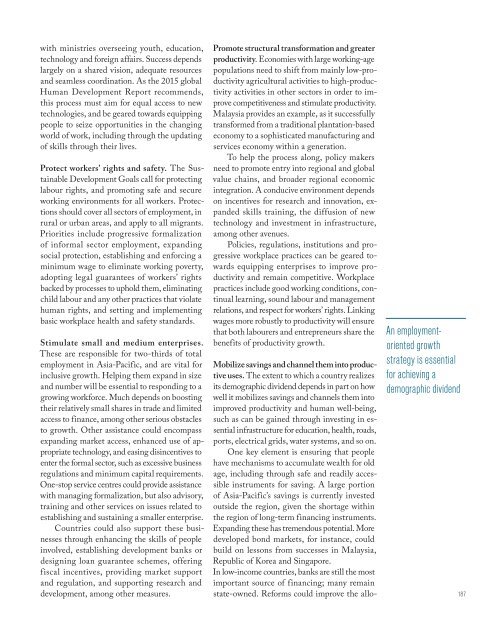SHAPING THE FUTURE HOW CHANGING DEMOGRAPHICS CAN POWER HUMAN DEVELOPMENT
1VPo4Vw
1VPo4Vw
Create successful ePaper yourself
Turn your PDF publications into a flip-book with our unique Google optimized e-Paper software.
with ministries overseeing youth, education,<br />
technology and foreign affairs. Success depends<br />
largely on a shared vision, adequate resources<br />
and seamless coordination. As the 2015 global<br />
Human Development Report recommends,<br />
this process must aim for equal access to new<br />
technologies, and be geared towards equipping<br />
people to seize opportunities in the changing<br />
world of work, including through the updating<br />
of skills through their lives.<br />
Protect workers’ rights and safety. The Sustainable<br />
Development Goals call for protecting<br />
labour rights, and promoting safe and secure<br />
working environments for all workers. Protections<br />
should cover all sectors of employment, in<br />
rural or urban areas, and apply to all migrants.<br />
Priorities include progressive formalization<br />
of informal sector employment, expanding<br />
social protection, establishing and enforcing a<br />
minimum wage to eliminate working poverty,<br />
adopting legal guarantees of workers’ rights<br />
backed by processes to uphold them, eliminating<br />
child labour and any other practices that violate<br />
human rights, and setting and implementing<br />
basic workplace health and safety standards.<br />
Stimulate small and medium enterprises.<br />
These are responsible for two-thirds of total<br />
employment in Asia-Pacific, and are vital for<br />
inclusive growth. Helping them expand in size<br />
and number will be essential to responding to a<br />
growing workforce. Much depends on boosting<br />
their relatively small shares in trade and limited<br />
access to finance, among other serious obstacles<br />
to growth. Other assistance could encompass<br />
expanding market access, enhanced use of appropriate<br />
technology, and easing disincentives to<br />
enter the formal sector, such as excessive business<br />
regulations and minimum capital requirements.<br />
One-stop service centres could provide assistance<br />
with managing formalization, but also advisory,<br />
training and other services on issues related to<br />
establishing and sustaining a smaller enterprise.<br />
Countries could also support these businesses<br />
through enhancing the skills of people<br />
involved, establishing development banks or<br />
designing loan guarantee schemes, offering<br />
fiscal incentives, providing market support<br />
and regulation, and supporting research and<br />
development, among other measures.<br />
Promote structural transformation and greater<br />
productivity. Economies with large working-age<br />
populations need to shift from mainly low-productivity<br />
agricultural activities to high-productivity<br />
activities in other sectors in order to improve<br />
competitiveness and stimulate productivity.<br />
Malaysia provides an example, as it successfully<br />
transformed from a traditional plantation-based<br />
economy to a sophisticated manufacturing and<br />
services economy within a generation.<br />
To help the process along, policy makers<br />
need to promote entry into regional and global<br />
value chains, and broader regional economic<br />
integration. A conducive environment depends<br />
on incentives for research and innovation, expanded<br />
skills training, the diffusion of new<br />
technology and investment in infrastructure,<br />
among other avenues.<br />
Policies, regulations, institutions and progressive<br />
workplace practices can be geared towards<br />
equipping enterprises to improve productivity<br />
and remain competitive. Workplace<br />
practices include good working conditions, continual<br />
learning, sound labour and management<br />
relations, and respect for workers’ rights. Linking<br />
wages more robustly to productivity will ensure<br />
that both labourers and entrepreneurs share the<br />
benefits of productivity growth.<br />
Mobilize savings and channel them into productive<br />
uses. The extent to which a country realizes<br />
its demographic dividend depends in part on how<br />
well it mobilizes savings and channels them into<br />
improved productivity and human well-being,<br />
such as can be gained through investing in essential<br />
infrastructure for education, health, roads,<br />
ports, electrical grids, water systems, and so on.<br />
One key element is ensuring that people<br />
have mechanisms to accumulate wealth for old<br />
age, including through safe and readily accessible<br />
instruments for saving. A large portion<br />
of Asia-Pacific’s savings is currently invested<br />
outside the region, given the shortage within<br />
the region of long-term financing instruments.<br />
Expanding these has tremendous potential. More<br />
developed bond markets, for instance, could<br />
build on lessons from successes in Malaysia,<br />
Republic of Korea and Singapore.<br />
In low-income countries, banks are still the most<br />
important source of financing; many remain<br />
state-owned. Reforms could improve the allo-<br />
An employmentoriented<br />
growth<br />
strategy is essential<br />
for achieving a<br />
demographic dividend<br />
187


